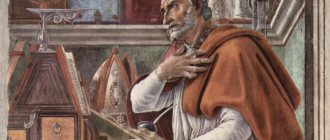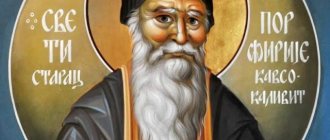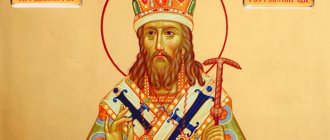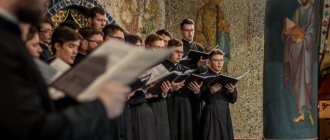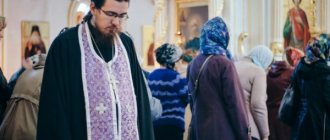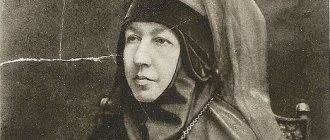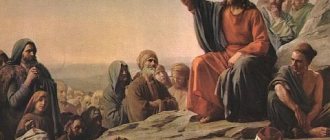In the history of the Church there are very special, turning events that determine the further development of theological thought. One of them was the works of the most prominent theologian and teacher of the Church, Augustine the Blessed. Aurelius Augustine of Hippo is the most prominent representative of medieval philosophy , revered in the Orthodox, Catholic and Protestant faiths with the rank of blessed. His works not only systematized the Orthodox doctrine of the Trinity, but also introduced into Christian dogmatics a powerful philosophical apparatus that was so necessary for it.
Biography
The name of Blessed Aurelius Augustine is familiar not only to adherents of Orthodoxy, Catholicism and Lutheranism, but also to those who are interested in medieval philosophy and its dogmatics. The legendary “Confession”, created by him at the age of 43, is rightfully considered a treasury of world literature and a storehouse of wisdom - it presents not only the search for answers to eternal questions, but also the first autobiography of the author in history before reaching the age of Christ.
Christianity
In 383, Augustine went to Mediolan (Milan), where he received the position of rhetorician. Being an inquisitive person, he began to attend the sermons of Bishop Ambrose, thanks to whom he comprehended all the beauty and depth of Christian teaching. On Easter 387 he was baptized by Ambrose.
After the death of his parents, Augustine donated his entire inheritance to the needs of the Church. In 391, Bishop Valerius ordained him a priest, and Augustine began to preach a lot, spreading the Christian faith everywhere. After the death of the bishop, Augustine headed the Ippon diocese and led it until the end of his days.
Fate
Thanks to surviving sources, it is known that Augustine came into this world on the 13th day of November 354 in Tagaste, a settlement then located in North Africa, and now in Algeria. Father Patricius, who held an official position in the local municipality, gravitated towards paganism throughout his entire adult life (and only before his death was baptized), and mother Monica, who gave birth to the future famous philosopher at the age of 22, gravitated towards Christianity.
Blessed Aurelius Augustine and his mother Monica. Artist Arie Schaeffer / London National Gallery
In addition to the “little emperor” (this is how the name Aurelius sounds in translation), there were two more children in the family - information about Augustine’s sister has not been preserved, and brother Navigius subsequently joined his teaching. Each parent had their own responsibilities for raising their heirs: Monica was responsible for their spiritual formation, and Patricius relied on a good education, because this would allow him to support his father and mother in old age.
As for school, Augustine could not stand strict discipline and the endless memorization of certain rules, and therefore did not like the imposed Greek language, preferring Latin. The teenager, who had been trained in Madaura, where he became acquainted with Virgil's Aeneid, was sent to Carthage to learn the secrets of rhetoric, with the help of a family friend.
Early writings.
Of the dialogues written in Kassitsiak, two deserve brief mention. Against academics
contains a refutation of skepticism.
There, in particular, it is said that the skeptics’ reliance on probabilistic knowledge is meaningless without some knowledge of the actual truth, since talking about the probability of something is only possible in the sense of recognizing its similarity to the truth. Continuing this theme in the dialogue On the Blessed Life
, Augustine argues that happiness does not consist in the pursuit of wisdom, but in its acquisition.
Of much greater interest are the Soliloquia
, written by Augustine shortly before baptism in the form of a dialogue between the soul and the mind. They are preceded by a prayer in which he declares his desire to know only two things: God and the soul. If both are inaccessible to sensory perception, then how can they be known at all? Augustine resorts to an analogy here. In the case of ordinary sense perception, knowledge is achieved when we direct our gaze to a visible object illuminated by material light. But is not the knowledge of God achieved in a similar way when the mental gaze is directed to intelligible truths, illuminated by the spiritual light emanating from God? Reason achieves its goal in the act of contemplation, in which the soul meets God, and from God emanates the light of faith, hope and love, healing the soul and allowing it to penetrate with its gaze beyond the limits of transitory things. This theory of divine illumination, later developed in other writings of Augustine, becomes one of the cornerstones of Augustinianism.
Works
- 397-400 ‒ “Confession” in 13 books
- 386-391 ‒ “Against the Academicians” in 3 books
- 386-391 ‒ “On the Blissful Life”
- 386-391 ‒ “Monologues” in 2 books
- 388-389 ‒ “On free decision” in 3 books
- 389-391 ‒ “On true religion”
- 393 ‒ “On faith and symbol”
- 396-427 ‒ “On Christian teaching” in 4 books
- 400 ‒ “On monastic work”
- 400-415 ‒ “On the Trinity” in 15 books
- 413-426 ‒ “About the City of God” in 22 books
- 417 ‒ “On the grace of Christ and original sin against Pelagius and Celestius” in 2 books
- 421 ‒ “On the soul and its origin” in 4 books
- 426-427 ‒ “On grace and free will”
- 426-427 ‒ “Revisions” in 2 books
AUGUSTINE
The consequences of the fall of the first parents, as the human race multiplied, spread to their offspring, who, according to A., became a mass of condemned and perishing sinners (massa peccati, massa damnata, massa perditionis - see De civ. Dei. XXI 12). With the loss of freedom of choice, people on their own were no longer able not only to do good, but even to desire it. (It should be noted that in the early period, from the first philosophical works to the anti-Manichaean treatises, A. extended freedom of choice not only to Adam, but to all people, which served him as a strong argument against the Manichaean doctrine of the evil principle - see De lib. arb. I-III. The idea of a person’s loss of free will and the associated idea of predestination arose in A. around 395.) If people have retained free will, it is only in relation to sinful actions. The desire for good, as A. believes, now does not depend on the person himself, but is invested into him directly by God. On their own, people could not return to their original state. In addition, Adam's guilt passed on to all his descendants and made them “children of wrath.” Therefore, an Intercessor and Reconciler was needed, who would pacify this righteous wrath of God (ira Dei) through the offering of a sufficient sacrifice for the sin of all mankind, and would also show in Himself the regenerating effect of God’s grace on human nature (De Trinit. XIII 22) .
Christology in the system of A. is of secondary importance and is only a moment of the more general doctrine of grace. For a long time before his conversion, A. saw in Christ only an outstanding man and the greatest prophet, who came to give an example of true reverence for God and love for others (Confess. VII 24-25). But very soon A. came to the Orthodox Church. the teaching that the Only Begotten Son of God, God the Word, consubstantial with the Father in Divinity, remaining what he was, became what he was not - a man, consubstantial with us. This happened through the perception (suscipere, induere) or union (conjungere) of the integral human nature - rational soul and body - into the unity of the Divine Person (in unitate personae) of the Son of God, so that One and the same was at the same time God and man, since he had two nature - Divine and human (De Trinit. IV 31; XIII 24). In this case, neither the Divinity of Christ changed into humanity, nor was humanity absorbed into His Divinity. Without losing or diminishing the Image of God (forma Dei), His Divine nature, in which He is equal to the Father and the Holy Spirit (servata aequalitate naturae; In Iohan. Evang. XVI 19), Christ, having diminished Himself (exinaniens se), took on the “form of a servant” (formam servi), that is, human nature, which is why He became less than the Father (cf. John 14:28). A. saw the similarity of the union of two natures in one person in the union of soul and body in an individual person. The unity of the Person of the God-Man in the system of A. is ensured by the intercommunication of natures, so that we can say that the King of Glory was crucified (albeit in human weakness) and the Son of Man will judge the living and the dead (albeit by Divine power). According to His earthly birth, Christ was sinless, since His conception was accomplished by the power of the Holy Spirit, seedless and manless, and, therefore, was not accompanied by carnal lust, which is a carrier of sin (Enchir. 41).
The purpose of the Incarnation of God is not limited only to the reconciliation of man with God through Christ’s offering of an atoning sacrifice (redemptio) for the sins of people (Enchir. 33; 61-62). A. saw several such goals: the restoration of human nature to its undamaged state, the salvation of humanity from the power of the devil and death (Christ brought the devil a ransom (pretium) for the sinned humanity that was subordinate to him - see De Trinit. XIII 18-19 ), resurrection from the dead as a guarantee of future life. general resurrection, the appearance on earth of the eternal Divine Truth, instructing people in the true faith, an example of humility (humilitas Dei) and righteous life, etc. It was in the God-man Christ that humanity achieved the goals set for it by God in Paradise: Christ, by his submission to the will of the Father, found the real freedom of will, freedom from sin (“greater freedom”), for He can no longer sin, and by His resurrection from the dead He achieved a real, “greater immortality,” for He can no longer die (see De civ. Dei. XXII 30 ). Through Christ, the only begotten Son of God, who through his mercy became the Son of man, people, being by nature sons of men, by grace received the opportunity to become sons of God (De civ. Dei. XXI 15).
The doctrine of the grace of God (gratia Dei) as a special action of God on man is an important position of A. soteriology, which, however, is not consistent with the teaching of Orthodoxy. Churches. Polemicizing with the Pelagian thesis “posse hominem sine peccato esse” (it is possible for a person to be without sin), which denied original sin and affirmed the possibility of saving a person solely by one’s own strength, without the action of God’s grace, A. deviated to the extreme of anthropological minimalism. Based on his idea of man’s loss of free will after the Fall and of slavery to sin, A. believed that man is saved only by the grace and mercy of God, that is, a “gift” (gratis), regardless of the previous merits of the man himself (sine ullis praecedentibus meritis - De Trinit. XIII 17). This mercy of God was manifested primarily in the atoning sacrifice of Christ (gratia Christi, gratia Dei propter Christum). However, even the opportunity to assimilate the fruits of this sacrifice now does not depend on man, for faith in Christ itself, and the fulfillment of His commandments, and good deeds should be attributed only to the grace of God. Grace as the inner, miraculous and inexpressible power of God (mirabilis et ineffabilis potestas Dei) directly produces “good wills” (bonas voluntates) in the hearts of people. The action of grace, creating a good will and accompanying its activity, must continue until the end of life so that a person can achieve salvation. Whoever is not given the gift of constant abiding in goodness (donum perseverantiae), whom grace leaves even at the very end of life, is inevitably drawn by his own evil will to death, despite all previous good deeds. The grace of God is not given to everyone. The human race was initially, in Divine foreknowledge, distributed among those on whom the full power of God's grace would be revealed - the chosen (electi), the predestined (praedestinati), and on those on whom the full power of God's justice would be revealed - the rejected (reprobati). The foundations of such double predestination (praedestinatio) lie in Divine Wisdom and Will (De civ. Dei. XXI 12; Enchir. 99-104) and are incomprehensible to the human mind. The power of grace, as a manifestation of the omnipotent Will of God, has an irresistible effect on man (gratia irresistibilis, indeclinabilis). This irresistible action of grace does not destroy human freedom, because, according to A., in a fallen state, a person does not have it at all: on the contrary, grace restores true human freedom, resolving only the bonds of sin by which a person is bound in his normal state (Confess. VII 27; VIII 10-12; Enchir. 105-107). It should be noted, however, that in lit. In our understanding, such a teaching is closely related to ancient fatalism, which was certainly deeply alien both to A. himself and to all patristic theology. This is the main inconsistency of A.'s soteriology, manifested in many of his statements that do not fit into the concept of predestination. The contradiction between man's freedom and responsibility for his actions and his salvation by the grace of God is removed only by the teaching of synergy between human and Divine will, which is an integral part of Orthodoxy. soteriology.
Spiritual quest
In the biography of Aurelius Augustine, it is worth noting the year 373, when Cicero’s manuscript entitled “Hortensius” fell into the hands of the young man. This philosophical work shocked Augustine so much that he seriously thought about the meaning of life and for the first time analyzed his own life values.
During this period, Augustine was not yet morally ready to accept Christianity, which was facilitated by the upbringing of his pagan father. The false teaching of the Manichaeans, who recognized only two principles - good and evil, turned out to be much closer and more understandable to the young man. The period of Augustine's passion for Manichaeism lasted almost 10 years, until 382.
After completing his education in Carthage, Augustine returned to Tagasta, where he taught grammar for some time. However, the young man’s inquisitive mind needed new knowledge, and he returned to Carthage again, where he began to study natural sciences in depth.
By that time, Augustine had become disillusioned with Manichaeism, which could not provide comprehensive answers to many of his questions.
Sermons
Nearly a third of Augustine's surviving works consist of sermons—more than 1.5 million words, most of which were recorded by scribes as they were delivered. Many of these were simple summaries of Scripture read aloud in worship according to church rules, but Augustine also followed specific programs. There are sermons on all 150 Psalms, which he collected in a separate collection, Enarrationes in Psalmos (392–418; Observations on the Psalms). This is perhaps his best work, for he finds in the sublime spiritual poetry of the Hebrew epistles something he can consistently apply to his view of a gritty, realistic Christianity. His Treatise on the Gospel of John is a complete commentary on the most philosophical text of all the Gospels. The other sermons deal with most of Scripture, but it is worth noting that Augustine said almost nothing about the prophets of the Old Testament, and what he said about St. Paul, appeared in his written works, but not in his public sermons.
Last years and death
Aurelius Augustine was baptized in 387 along with his son Adeodatus. After that, he sold all his property and distributed the proceeds to the poor.
Soon Augustine returned to Africa, where he founded a monastic community. Then the thinker was promoted to presbyter, and later to bishop. According to some sources, this happened in 395.
Aurelius Augustine died on August 28, 430 at the age of 75. He died during the Vandal siege of the city of Hippo.
Subsequently, the remains of St. Augustine were bought by the Lombard king named Liutprand, who ordered them to be buried in the church of St. Petra.
Other works
None of Augustine's other works were as widespread as his two great masterpieces.
De doctrina christiana (Books I–III, 396/397, Book IV, 426; Christian Doctrine) was begun in the early years of Augustine's bishopric, but he completed it 30 years later. This imitation of the manner of the orator of Cicero sets forth a theory of the interpretation of Scripture and is a practical guide for the would-be preacher. In the Middle Ages, it was used as an educational treatise, asserting the primacy of religious teaching based on the Bible.
